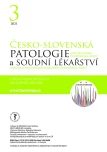The possibilities of molecular testing of somatic aberrations in tumor tissue using NGS in routine practice - current situation in the Czech Republic
Authors:
Pavel Dundr 1; Radoslav Matěj 2,3; Aleš Ryška 4
; Jana Prausová 5; Jindřich Fínek 6; Luboš Petruželka 7; Ivana Stružinská 1
Authors‘ workplace:
Ústav patologie 1. LF UK a VFN v Praze
1; Ústav patologie, 3. LF UK a FN Královské Vinohrady
2; Ústav patologie a molekulární medicíny, 3. LF UK a Fakultní Thomayerova nemocnice
3; Fingerlandův ústav patologie, LF UK a FN Hradec Králové
4; Onkologická klinika 2. LF UK a Fakultní nemocnice v Motole
5; Onkologická a radioterapeutická klinika LF UK v Plzni a Fakultní nemocnice Lochotín
6; Onkologická klinika 1. LF UK a VFN v Praze
7
Published in:
Čes.-slov. Patol., 57, 2021, No. 3, p. 147-149
Category:
Reviews Article
Overview
Molecular testing of tumor tissue for the detection of somatic aberrations using NGS is increasingly gaining significance in routine practice. The technical aspects of testing are standardized and currently do not pose a problem. However, the situation is evolving very rapidly regarding the indication of testing, which depends on the sometimes rapidly developing medical knowledge and needs in clinical practice. In order to implement NGS testing in practice and arrange its reimbursement by the health care system, first it is necessary to reach an agreement on the level of professional societies concerning the definition of priority and medically clearly justified areas in which molecular testing has a clear impact on therapeutical choices. The next step is to reach an agreement with the health insurance companies regarding NGS testing. The aim of this article is to provide an overview of the issue of routine tumor tissue testing using the NGS method covered by public health insurance, with a summary of the current situation in the Czech Republic. Only the testing of somatic aberrations in solid tumors performed at pathology departments is discussed. The issue of testing in haemato-oncological centres is not the subject of this review.
Keywords:
NGS – diagnostics – Prognosis – prediction
Sources
1. Matias-Guiu X, Stanta G, Carneiro F, et al. The leading role of pathology in assessing the somatic molecular alterations of cancer: Position paper of the european society of pathology. Virchows Arch 2020; 476(4): 491-497.
2. Mosele F, Remon J, Mateo J, et al. Recommendations for the use of next-generation sequencing (ngs) for patients with metastatic cancers: A report from the esmo precision medicine working group. Ann Oncol 2020; 31(11): 1491-1505.
3. Luchini C, Lawlor RT, Milella M, Scarpa A. Molecular tumor boards in clinical practice. Trends Cancer 2020; 6(9): 738-744.
4. Condorelli R, Mosele F, Verret B, et al. Genomic alterations in breast cancer: Level of evidence for actionability according to esmo scale for clinical actionability of molecular targets (escat). Ann Oncol 2019; 30(3): 365-373.
5. Li MM, Datto M, Duncavage EJ, et al. Standards and guidelines for the interpretation and reporting of sequence variants in cancer: A joint consensus recommendation of the association for molecular pathology, american society of clinical oncology, and college of american pathologists. J Mol Diagn 2017; 19(1): 4-23.
6. Chakravarty D, Gao J, Phillips SM, et al. Oncokb: A precision oncology knowledge base. JCO Precis Oncol 2017; 2017: PO.17.00011.
Labels
Anatomical pathology Forensic medical examiner ToxicologyArticle was published in
Czecho-Slovak Pathology

2021 Issue 3
-
All articles in this issue
- Next-Generation Pathology
- Cesta k cíli vede přes spolupráci
- 'PATOLOGIE MĚKKÝCH TKÁNÍ
- 'PATOLOGIE ORL OBLASTI
- 'UROPATOLOGIE
- 'GYNEKOPATOLOGIE
- 'NEFROPATOLOGIE
- 'HEPATOPATOLOGIE
- 'KARDIOPATOLOGIE
- 'HEMATOPATOLOGIE
- 'PATOLOGIE MĚKKÝCH TKÁNÍ
- 'PATOLOGIE GIT
- 'CYTODIAGNOSTIKA
- 'LABORATORNÍ METODY
- Next generation sequencing – a science tool or routine pathology?
- 'PULMOPATOLOGIE
- Next generation sequencing and the molecular tumor board from the point of view of oncologists
- The possibilities of molecular testing of somatic aberrations in tumor tissue using NGS in routine practice - current situation in the Czech Republic
- Next generation sequencing and its application in the diagnostics of neuromuscular diseases
- Methylation pattern in the diagnosis and prognosis of brain cancer
- Review of tumor infiltrating lymphocytes assessment in breast cancer in routine diagnostic practice
- Undiagnosed cryptococcal meningoencephalitis with extensive hypoxic-ischemic brain injury mimicking grade 3 diffuse axonal injury
- Doporučení pro testování PD-L1: metodika testování a reportování výsledků Verze_1 (17. 5. 2021)
- Molecular testing in endometrial carcinoma (Joint recommendation of Czech Oncological Society, Oncogynecological Section of the Czech Gynecological and Obstetrical Society, Society of Radiation Oncology, Biology and Physics, and the Society of Czech Pathologists)
- Giant cell myocarditis in young woman diagnosed at the autopsy: a case report
- Czecho-Slovak Pathology
- Journal archive
- Current issue
- About the journal
Most read in this issue
- Doporučení pro testování PD-L1: metodika testování a reportování výsledků Verze_1 (17. 5. 2021)
- Next generation sequencing – a science tool or routine pathology?
- Molecular testing in endometrial carcinoma (Joint recommendation of Czech Oncological Society, Oncogynecological Section of the Czech Gynecological and Obstetrical Society, Society of Radiation Oncology, Biology and Physics, and the Society of Czech Pathologists)
- Methylation pattern in the diagnosis and prognosis of brain cancer
